Indigenous representatives from 35 countries issued a declaration Thursday criticizing the fact that they are too rarely consulted about mining that takes place on or near their lands, an issue that has become more acute with increased demand for minerals needed in the transition to a cleaner energy system.
"We recognize and support the need to end fossil fuel reliance and shift to renewable energy as critical in addressing the climate crisis," the statement read. "However, the current trajectory of the energy transition fails to meet the criteria of justice, social equity, and environmental sustainability, particularly from the perspectives of Indigenous Peoples' rights and well-being."
The document comes out of the Conference on Indigenous Peoples and the Just Transition which took place in New York last week. Indigenous leaders from the U.S., Canada, Brazil, Kenya, Australia and Norway among other countries attended.
Lithium, nickel and cobalt are often used in batteries, which are key to both electric vehicles and extending production from solar and wind farms. Copper and aluminum are in higher demand as countries expand their electrical grids. Lesser-known rare earth elements are used in magnets in electric motors.
Mining has left a legacy of environmental damage in many places for more than a century and is now expanding.
The declaration also mentioned increasing criminal persecution and attacks against Indigenous leaders.
The statement called out both the International Council of Mining and Metals, a trade group that says it represents a third of the industry, and the International Seabed Authority, for failing to respect Indigenous rights and conducting what it calls business as usual. Neither group responded to queries from The Associated Press.
About half of energy transition minerals and metal projects are located on or near the lands of Indigenous and other subsistence farmers, according to a study published in 2022 by the journal Nature Sustainability.
"We are those who generate the least impact on the planet," Ruth Alipaz Cuqui, an Indigenous leader from the Bolivian Amazon who attended the conference, told the AP in a phone interview. "But even so, we understand that we have to be part of this whole process." That participation should be comprehensive or else the energy transition will not be fair, she said.
Alipaz Cuqui cited conflicts in the arid region of Uyuni, Bolivia, where local communities oppose the intense use of water to produce lithium. The project, still in its beginnings, is a joint venture between Bolivia and China. The Bolivian Ministry of Energy did not respond to a request for comment.
The lead organizer for the conference was the Indigenous Peoples Rights International, a nonprofit registered in the Philippines and the U.S., with financial support from Nia Tero, a nonprofit that supports Indigenous rights, The Christensen Fund, the Henry Luce Foundation, the Waverley ST Foundation, and the Columbia Center on Sustainable Investment, according to the event website.




